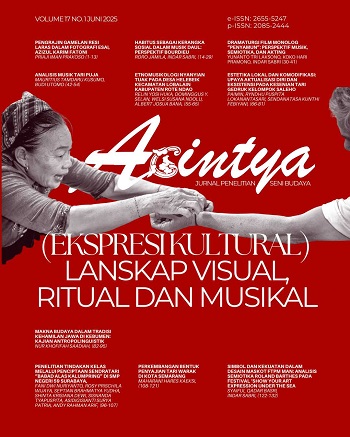SYMBOLS AND POWER IN THE MASCOT DESIGN OF FTPM MAN: A ROLAND BARTHES SEMIOTIC ANALYSIS IN THE CONTEXT OF THE ‘SHOW YOUR ART EXPRESSION UNDER THE SEA’ FESTIVAL
DOI:
https://doi.org/10.33153/acy.v17i1.7145Keywords:
Icon Design, Roland Barthes' Semiotics, FTPM MAN, Student Theater, Visual CommunicationAbstract
This paper aims to analyze the icon design of Festival Teater Pelajar dan Mahasiswa Nasional (FTPMN) 2024 with the title “Show Your Art Expression Under the Sea” through Roland Barthes' semiotic approach. The focus of the paper is to reveal the denotation, connotation, and mythical meanings contained in the icon design, as well as how this icon strengthens the festival's identity as a forum for student artistic expression. The research method used is qualitative with descriptive analysis of the visual elements of the icon, including colors, shapes, and symbols. The results showed that the 2024 (FTPMN) icon design not only represented the theme of the sea, but also implied the values of freedom of expression, collaboration, and cultural diversity. The conclusion of this research confirms that icon design acts as an effective visual communication tool in building the image and spirit of the festival.
Downloads
References
Adityawan, A. (2010). Desain grafis festival Jazz by the Sea: Analisis simbol dan Identitas Visual. Seni Dan Budaya, 12(3), 45–60.
Bachri, B. S. (2010). Meyakinkan Validitas Data Melalui Triangulasi Pada Penelitian Kualitatif. Teknologi
Pendidikan.
Barthes, R. (1972). Mythologies (A. Lavers, Trans.). Hill and Wang. (Original work published 1957).
Baudrillard, J. (1994). Simulacra and Simulation (S. F. Glaser, Trans.). University of Michigan Press.
Derizis, M., & Komara, E. (2020). Makna Logo Rumah Zakat (Studi Kualitatif dengan Pendekatan Analisis Semiotika Roland Barthes Mengenai Makna Logo Rumah Zakat). Buana Komunikasi (Jurnal Penelitian Dan Studi Ilmu Komunikasi), 1(1), 24. https://doi.org/10.32897/buanakomunikasi.2020.1.1.534
Eco, U. (1989). The Open Work (A. Cancogni, Trans.). Harvard University Press.
Hall, S. (1980). Encoding/decoding. In S. Hall, D. Hobson, A. Lowe, & P. Willis (Eds.). In Culture, Media,
Language. Routledge.
Haryati, S. (2014). Simbol Budaya Jawa dalam Desain Event Baluwarti. Komunikasi Visual, 8(2), 78–92.
Jadou, S. H., & Ghabra, I. M. M. M. Al. (2021). Barthes’ Semiotic Theory and Interpretation of Signs. International Journal of Research in Social Sciences and Humanities, 11(3). https://doi.org/10.37648/ijrssh.v11i03.027
Kementerian Pendidikan dan Kebudayaan. (2023). Laporan Partisipasi Pelajar dalam Festival Seni
Indonesia tahun 2023.
Kurniawan, D. (2020). Analisis Semiotika Ikon Olimpiade Tokyo 2020: Antara Globalisasi dan Identitas
Nasional. International Journal of Design and Culture, 15(1), 112–130.
Kurniawan, F. L., & Sayatman, S. (2018). Perancangan Maskot untuk Memperkuat Identitas Visual Kota
Kediri. Jurnal Sains Dan Seni ITS. https://doi.org/10.12962/j23373520.v7i1.29547
Peirce, C. S. (n.d.). Collected Papers of Charles Sanders Peirce (Vols. 1–8, C. Hartshorne & P. Weiss, Eds.).
Harvard University Press.
Rahmah, R. F., & Wibowo, A. A. (2023). Representasi Kesetaraan Gender Axe Pocket Parfume Versi
‘Dijemput Si Cantik: Kajian Semiotika Barthes. Acintya Jurnal Penelitian Seni Budaya, 15(1), 85–93. https://doi.org/10.33153/acy.v15i1.5102
Rayawulan, R. M., Lake, R. C., Boli, B., & Uak, A. T. M. (2023). BERPIKIR DESAIN DENGAN PENDEKATAN
SEMIOTIKA Studi Kasus: Desain Kantor Dprd Kabupaten Flores Timur. Jurnal Arsitektur ARCADE.
https://doi.org/10.31848/arcade.v7i1.2450
Trimo Wati, T. W., Dina Safira Ikmaliani, & Mustolehudin. (2022). Representasi Makna Denotasi dan
Konotasi dalam Lirik Lagu Kun Fayakun (Analisis Semiotika Roland Barthes). Alibbaa’: Jurnal Pendidikan Bahasa Arab, 3(1), 73–102. https://doi.org/10.19105/ajpba.v3i1.5172
Wicaksono, A. R., & Diyah Fitriyani, A. H. (2022). Analisis Semiotik Roland Barthes Pada Iklan Televisi
Pertamina Edisi Ramadan 1442 H. Acintya : Jurnal Penelitian Seni Budaya, 13(2), 155–164. https://doi.org/10.33153/acy.v13i2.3939
Downloads
Published
How to Cite
Issue
Section
License
Copyright (c) 2025 Syaiful Qadar Basri

This work is licensed under a Creative Commons Attribution 4.0 International License.
Author continues to retain the copyright if the article is published in this journal. The publisher will only need publishing rights




